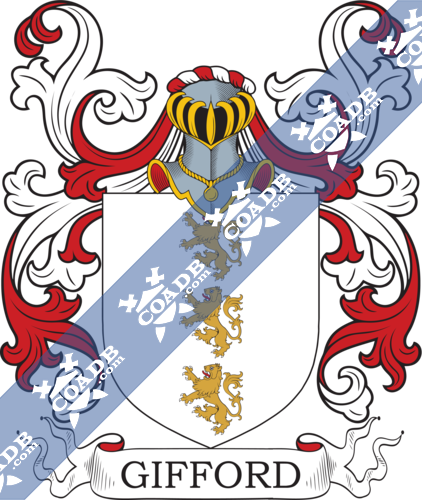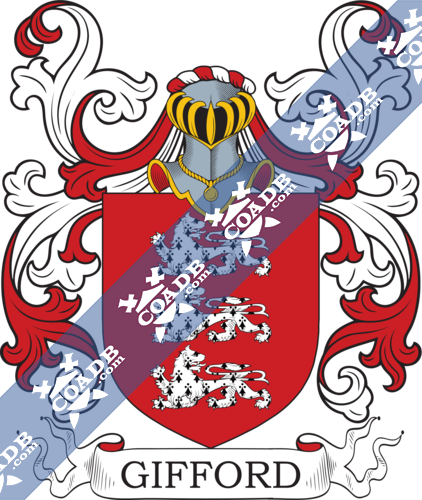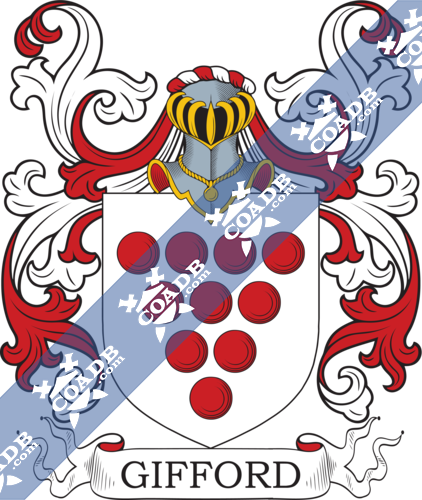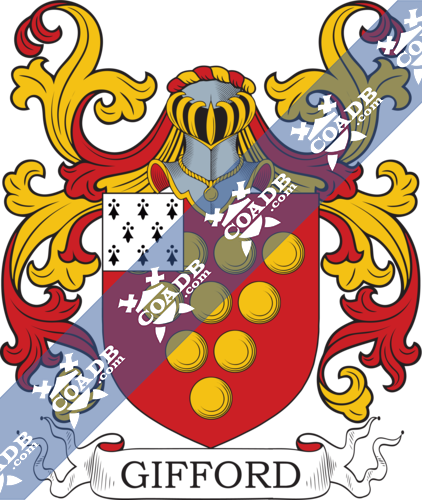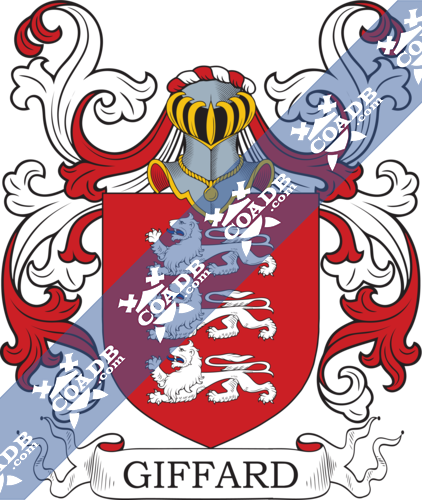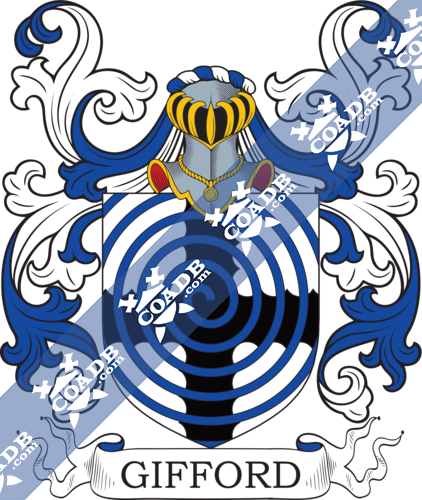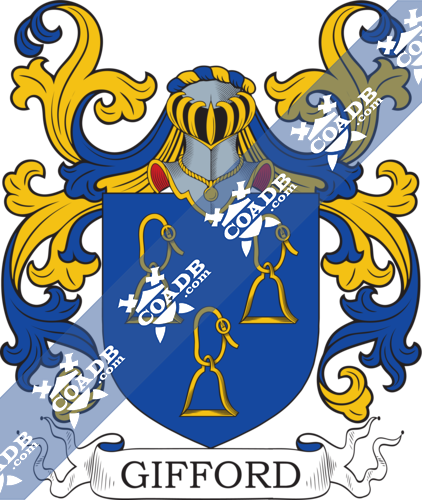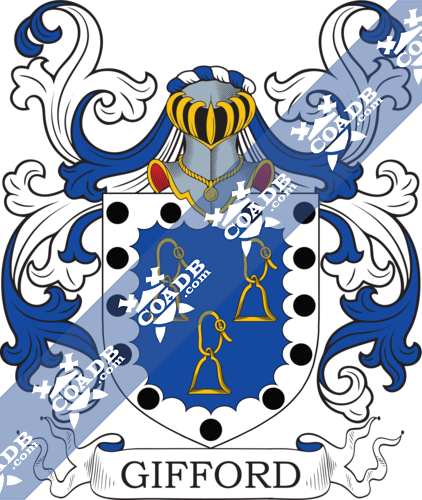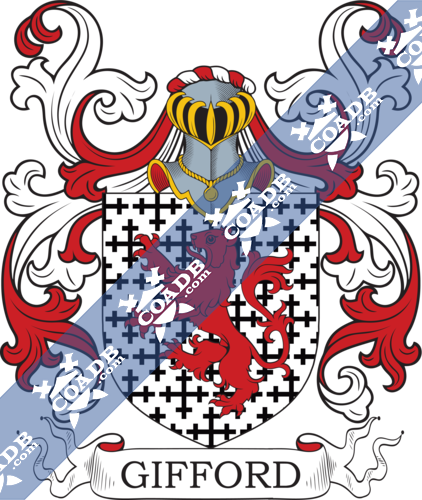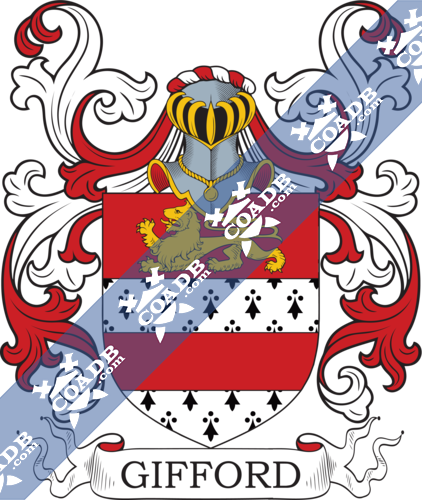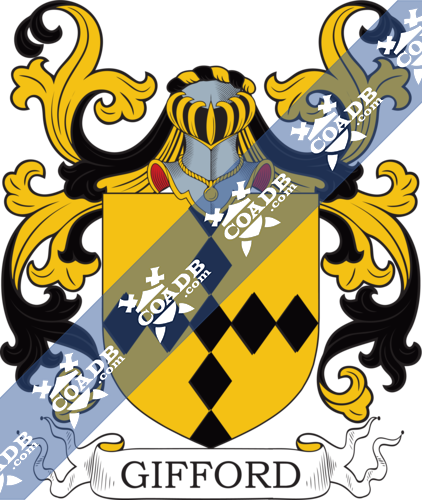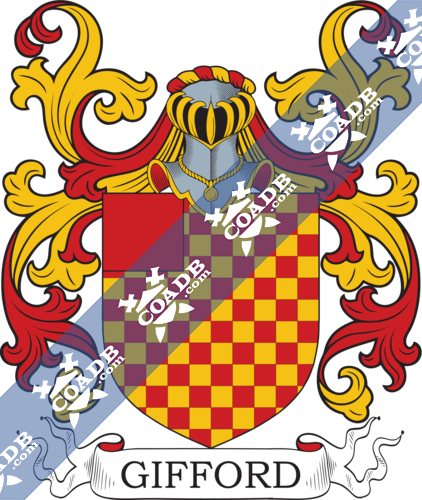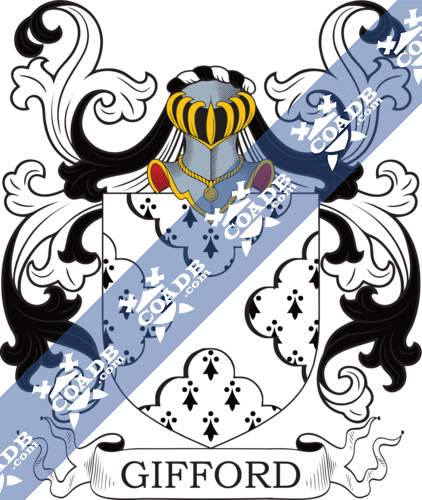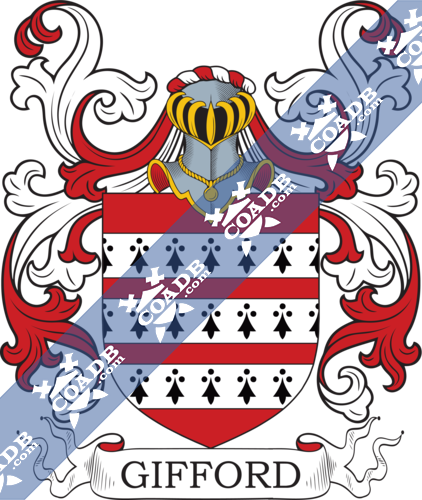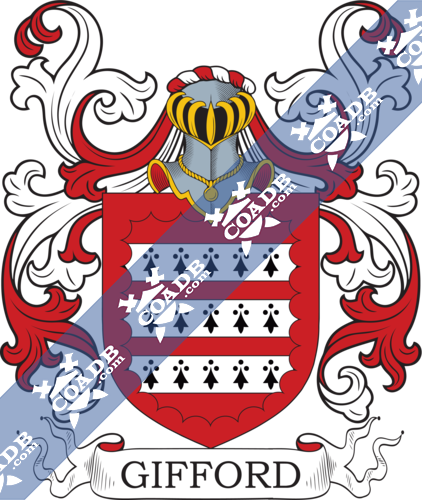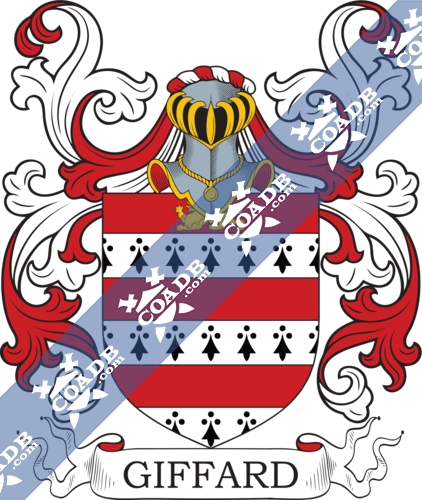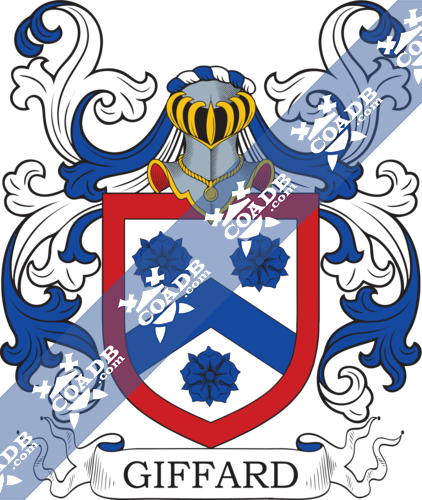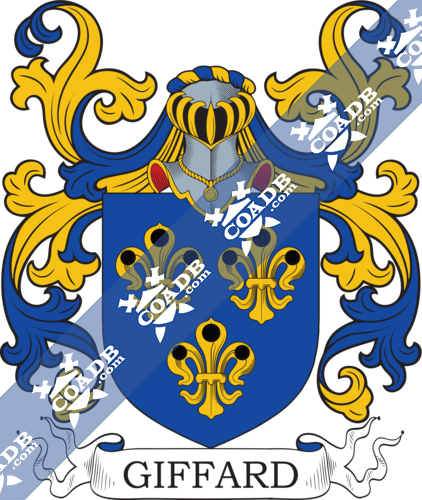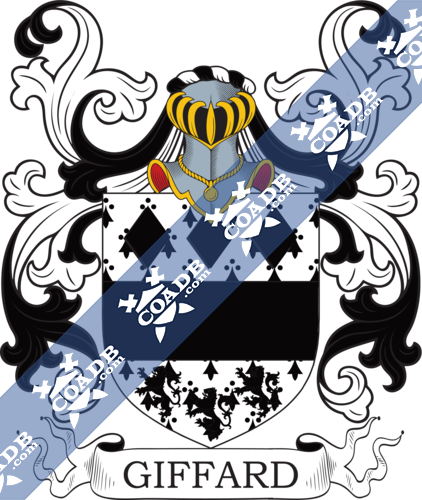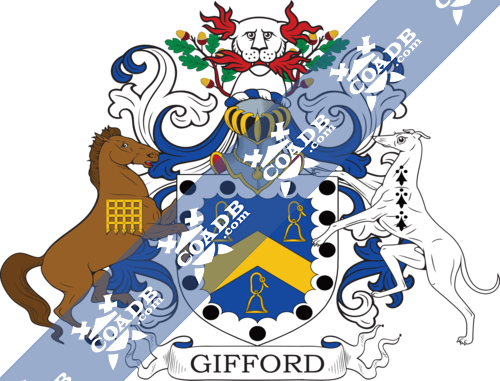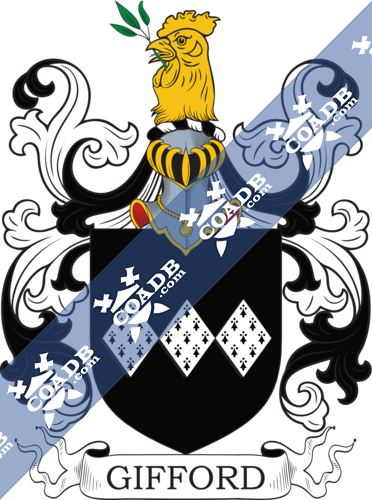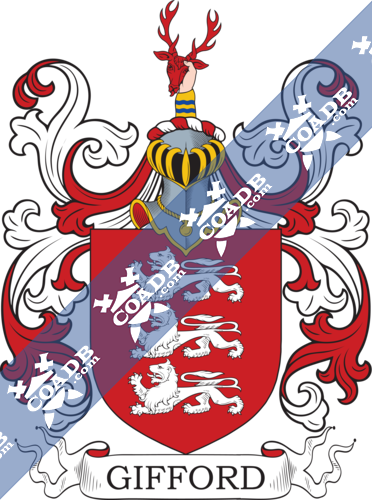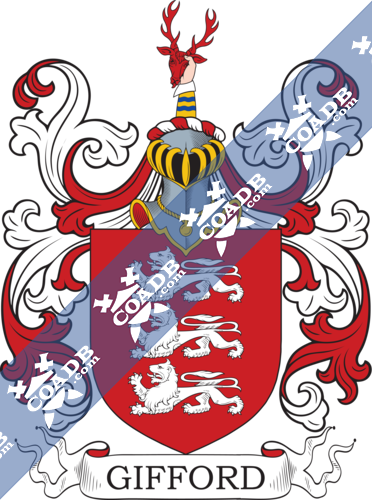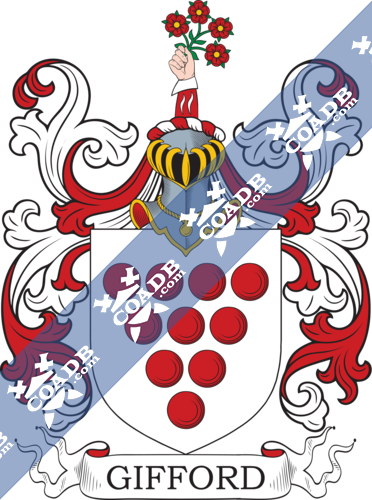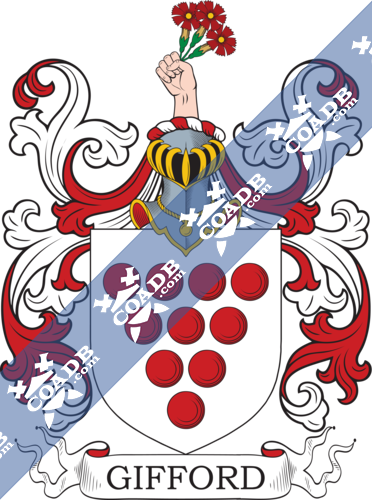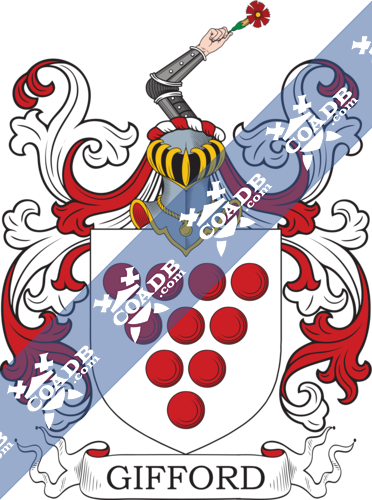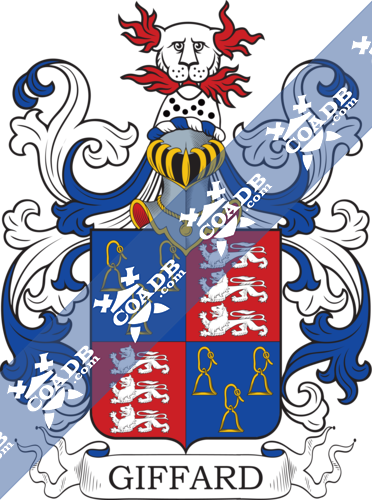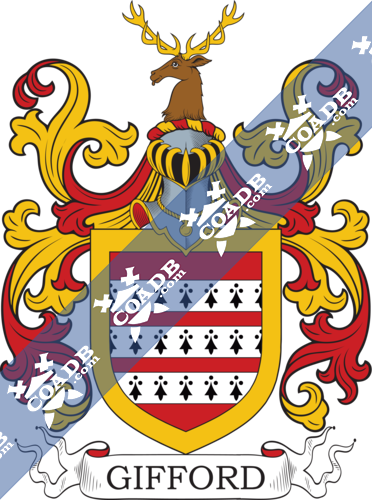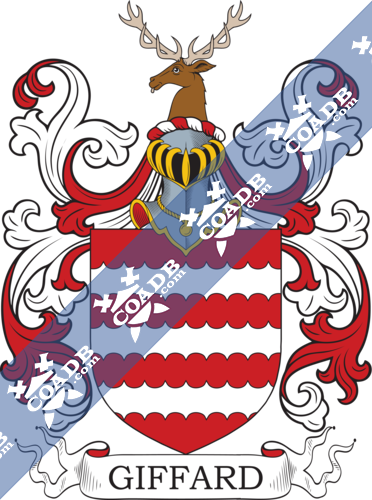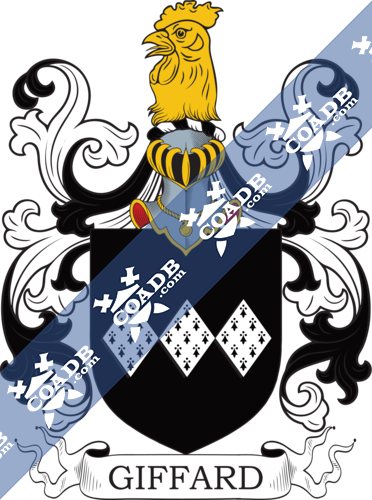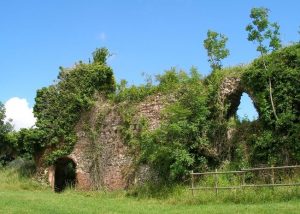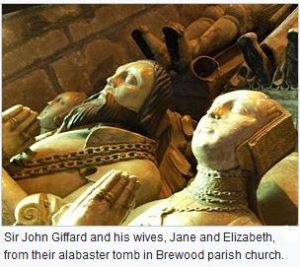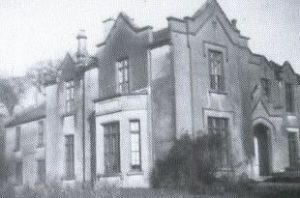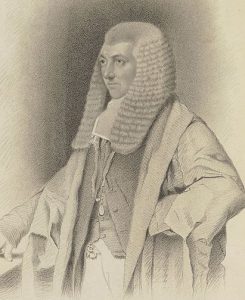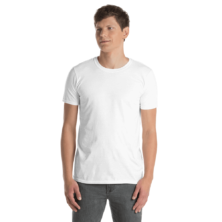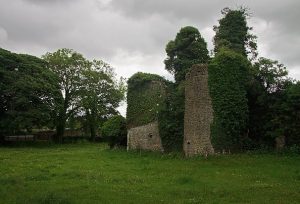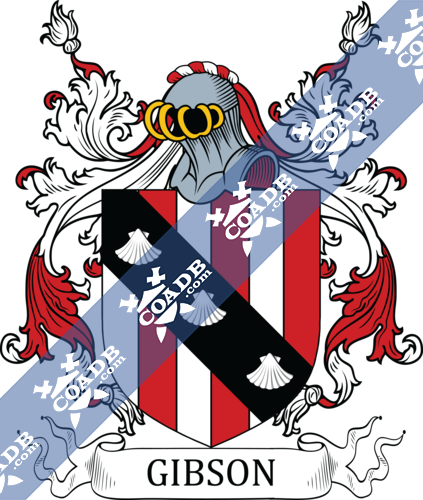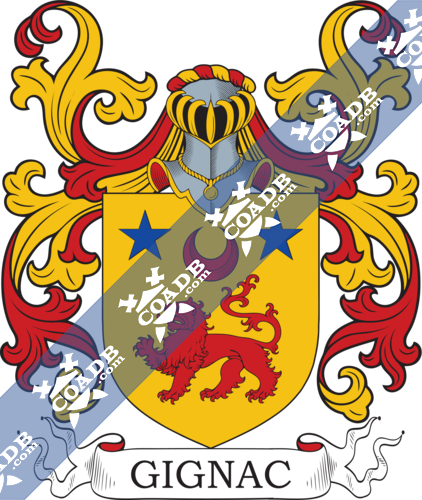Gifford Family Crest, Coat of Arms and Name History
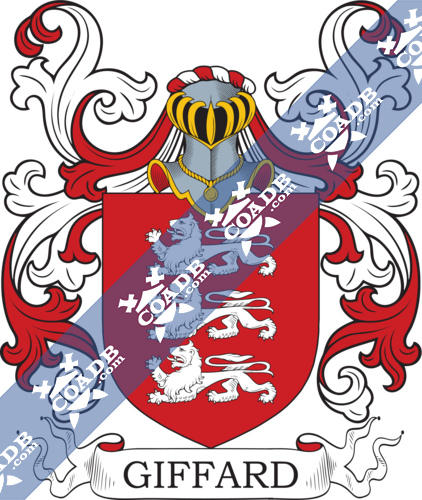
Gifford Coat of Arms Gallery
Don’t know which Coat of Arms is yours?
We can do a genealogical research. Find out the exact history of your family!
Learn MoreGifford Surname Name Meaning, Origin, History, & Etymology
This is a baptismal/patronymic surname meaning “the son of Giffard”, an old personal (first) name or a nickname for a chubby-cheeked (or bloated) person from the Old French word giffard (from the pejorative of giffel, meaning jaw or cheek) or perhaps even a derivation of the early Germanic masculine given name Gebhardt, consisting of the words geb (gift) and hard (brave). Another author, William Arthur, in his book, An Etymological Dictionary of Family and Christian Names states it derives from a Saxon word meaning liberal disposition or the giver, and it was also a name for a town on the water of Gifford, Haddington, Scotland, from the Celtic word gaf, meaning a hook, a bend, or ford. Yet another source, the Dictionary of American Family Names, states this last name is a habitational name for a person from Giffords Hall, Suffolk. It was originally spelled, in Old English, Gyddingford, which means “the ford associated with Gydda”, and that the name is hence comparable with the surname Giddens.
Mark Antony’s Lower’s nineteenth century book Patronymica Britannica states the following in regard to this surname: “The old historical Giffards of Normandy and England descended from the De Bollebecs, who were connected by marriage with Richard I., Duke of Normandy. Walter, son of Osborne de Bollebec, though surnamed “Giffard,” or “the Liberal,” seems also to have been conservative in the acquisition and retention of lands; for he got not only the fair domain of Longueville, near Dieppe, from Richard H. of Normandy, who created him Count de Longueville, but also the Earldom of Buckingham, with above a hundred manors in various counties of England, from William I., whom he had accompanied to the Conquest of this country. In Leland’s time there were four “notable houses” of Gifford remaining in England, in the cos. of Devon, Southampton, Stafford, and Buckingham. At the present time the only one of these existing is the Staffordshire family, whose ancestor married the heiress of Corbosone, temp. King Stephen, and thus became Lord of Chillington, which has ever since been the abode of his posterity”.
Another seat of the family was Bletchley in Buckinghamshire. The book A Topographical Dictionary of England by Samuel Lewis, state the following “Walter Gifford, Earl of Buckingham, possessed by grant from William Rufus the whole landed property of this parish, which was inherited by Richard de Clare, Earl of Hertford, who had married his granddaughter, Roesia”.
Spelling Variations
Some spelling variants or names with similar etymologies include Giffard, Giffarde, Gifforde, Jiffard, Gyffarde, Gyffard, Giford, Gifard, Giffoard, Gifferd, Gefford, Giffort, Giffurd, Gefart, Gifhart, Gyfhart, Goffurd, Gyffort, Giffert, Gefard, MacGiford (Irish), and Juffard, along with several others.
Popularity & Geographic Distribution
The last name Gifford ranks 1,716th in popularity in the United Status as of the 2000 Census. The name ranks particularly high in the following six states: Idaho, Maine, Nebraska, Alaska, Massachusetts, and Utah.
The surname Gifford frequency/commonness ranks as follows in the British Isles: England (2,243), Scotland (1,612th), Wales (1,965th), Ireland (3,804th) and Northern Ireland (3,642nd). In England, it ranks highest in counties Huntingdonshire and Cambridgeshire. In Scotland, the surname ranks highest in Shetland. In Wales, it ranks highest in Caernarfonshire. In Ireland, it ranks highest in county Down. In Northern Ireland, it ranks highest in county Wicklow.
The name is also present throughout the remainder English speaking world: Canada (3,290th), New Zealand (1,378th), Australia (2,160th), and South Africa (8,421st).
The 1890 book Homes of Family Names by H.B. Guppy, states the following in regard to this surname: “The name of Gifford is now established in Cambridgeshire, Hunts, Dorset, and Somerset. In the form of Giffard it was common in the 13th century in Cambridgeshire, Norfolk, Suffolk, and Oxfordshire (H. R.). The early Giffards were descended from the Giffards of Normandy, their first ancestor in this country having received from William the Conqueror over a hundred manors in different parts of England: there were four principal families last century, those of Devon, Hants, Bucks, and Staffordshire, the last named only now existing (L.). In the 17th century there were old established gentle families of the name in Devonshire, residing at Brightlegh, Weare, and Tiverton (Westcote’s “Devonshire.”)”.
Early Bearers of the Surname
Hugh de Giffard or Jiffard was a feudal baron in Scotland in the 1100s AD. Some believe his family came to Britain with William the Conqueror in 1066 AD, through the person of Walter, Count de Longueville, the nephew of Gunnor (lived in the 900s AD). However, others believe the family descended from the de Varenne or de Warrenne family and came from Longueville-dla-Gifart in Seine Maritime, a department in northern France. William Giffard, “the second of the Giffards of Yester was witness to numerous royal charters from before 1195 to after 1204; envoy to England in 1200; and alive in 1244”. In Scotland, Andreas Giffard was bailie of Aberdeen in 1408 AD, and Willmus Giffard common councilor, 1435 AD.
The earliest known bearer of this surname was Walter Gifard who was documented in the Domesday Book for Cambridgeshire in 1086 AD. The Hundred Rolls of 1273 AD, a census of Wales and England, known in Latin as Rotuli Hundredorum lists four bearers of this name as a first name: Giffard le Bretun Giffard Piscator, Gyffard Reynold (Buckinghamshire), and Gifford Wyting (Somerset). Giffard de Lucerna was recorded in 20 in 1292 AD in the Placita de Quo Warranto. The Poll Tax of Yorkshire in 1379 AD lists two bearers of this last name: Johanna Juffard and Johannes Juffard. Henry Gifford was documented in 1327 AD in Kirby’s Quest.
Gifford Family Tree & Gifford Genealogy
The following is a discussion of three different noble, royal, landed, or aristocratic families bearing this last name.
The Giffard genealogy begins with an ancient and distinguished family in England. One Osborne de Bolebec (circa 1020 to circa 1085), a noble Norman, born in Longueville-le-Giffard, living during the era of King Richard I of England, surname Sans Peur, Duke of Normany, married Aveline, sister of Gunnora, the second wife of Richard, Duke of Normandy, and had two sons with her as follows: Walter (obtained the name of Giffard or the Liberal, and was created a Count of Longueville by Duke Richard II, around 1025 AD, acquired the great renown and fame in the armies of William the Conquerors, obtained at least 107 lordships in the conquered nation, was Earl of county Buckingham, England) and Osborne. His second son, Osborne Gyffarde, also aided the Normans in their eleventh century conquest of England, received lands in Glouceser, holding the manors of Brimsfield, Rochemtune, Alderberie, and Stoche. He built a great castle that served as the family residence until it was demolished by the army of King Edward II around 1322 during the Baronial War. He died around 1086 and was succeeded by his son, Elias. This Elias Giffarde married a woman named Ala, and he gave lands and woods in Bockholy to the Abbey of St. Peter, in Gloucester, around the year 1100. He had two sons: Elias Giffarde (3rd Lord of Brimsfield, had sons named Elias, Walter, and Richard) and Gilbert. The younger son Gilbert, had a daughter who married Peter Corbizon of Studley, Chillington, as well as a son named William. This William Giffard is likely the first person of this family who bore a coat of arms, blazoned as follows: Azure, three stirrups or. He in turn had a son named Peter. This Peter Giffarde was distinguished for his military exploits in Ireland, under his kinsman, Strongbow, Richard de Clare, Earl of Pembroke, and he received, as a reward for these services, the Manor of Tighmolin in Ireland. He married his cousin Avicia Corbizon, and through this marriage, acquired the Manors of Chillington and Walton, in county Stafford, England. He was succeeded by his son, also named Peter. This Peter Giffard of Chillington, married Margaret de Chuddeley, and was in turn succeeded by his son John. This Sir John Giffard, married Ada, daughter of Hugh Courtenary, Baron of Okehampton. He died in 1316 AD and was succeeded by his son, also named Sir John. This Sir John Giffard was of Chillington who married Catherine Stafford of Marston, and through this marriage, possessed the Manors of Marston and Enson. He was elected to the Parliament. He died in 1366 and was succeeded by his son Edmund. Edmund of Chillington married a daughter of Venables Baron of Kinderton, and died in 1379, whereupon he was succeeded by his eldest son John. John was Lord of Chillington in 1394 and was in turn succeeded by his son Thomas. This Thomas Giffard, of Chillington, married Joyce, daughter and heiress of Sir Robert Fraunceys, of Whiston, and received as a dowry, that estate. He was the Sheriff of county Stafford in England in 1411. He died in 1416, leaving an only child named Robert. Robert Giffard, of Chillington, married (first) Isabella Blount, but did not father children with her. Secondly, he married Cassandra, daughter of Thomas Humphreston, and was succeeded by his son, John. This Sir John Giffard, Knight, of Chillington, married Joeosa Hoorde, and had two daughters with her as follows: Dorothea (married John Congreve of Congreve and later Francis Shirley) and Cassandra (married Humphrey Swinnerton of Swinnerton). He secondly married Elizabeth Greyseley, and had a daughter named Francis (married Sir John Talbot of Grafton) and a son and heir named Thomas. Sir John was a Sheriff, five times for his native county, and King Henry VIII granted him the dissolved Monastery of the Black Ladies at Brewood. He died in 1556 and was succeeded by his son Thomas. This son, Sir Thomas Giffard, first married Dorothy, daughter and heiress of Sir John Montgomery, and had a daughter with her named Elizabeth (who married Sir John Port of Ewall). He secondly married Ursula, daughter of Sir Robert Throckmorton of Coughton, with whom he fathered four sons and five daughters. He also served as High Sheriff of county Stafford, England (modern day Great Britain or United Kingdom). He died in 1560 and was succeeded by his eldest son John. This John was an Esquire of Chillington, as well as a High Sheriff in county Stafford, who in 1575, was honored with a visit from Queen Elizabeth. He married Joyce, daughter of James Leveson of Lilleshall and Trentham, and had eight sons and two daughters with her. He died in 1612 and was succeeded by his eldest son, Walter Giffard, Esquire of Chillington, who in 1579, married Phillippa, daughter and co-heir of Henry White of Southwarnborough, had numerous issue, including: Peter (heir) and Andrew (married Catherine Leveson, had issue named Thomas Augustine, and Bonaventure). This son Walter died in 1732 and was succeeded by his eldest son, Peter. This Peter Giffard, Esq. of Chillington, married Frances, second daughter of Walter Fowler of St. Thomas, and had several issue with her including Walter (heir) and John (of Black Ladies, married Catherine Hawkins of Nash, had son named John, grandsons named Peter, John, and Walter). The author states the following in regard to Peter: “Peter Giffard, in his extended and chequered life, saw the entire downfall and the perfect restoration of his family. From the commencement of the great rebellion, he appears to have taken an active and decided part in it, for at an early period we find his estates confiscated, and himself a prisoner. Chillington, so recently receiving a royal guest, became a royal garrison. The estates were sold by the Drury House Commissioners, and the members of the family, after fighting in the King’s army as long as any army existed, were in prison, in banishment, or in concealment. When Charles II made his ill-advised descent on England, 1651, several of the Giffards joined him, and fought at Worcester. After his defeat, the King owed his safety, in a great measure, to the guidance of Charles Giffard, a nephew of Peter Giffard, of Chillington, and the fidelity of the Pendrills, the devoted retainers of the Giffards”. He died in 1663 and was succeeded by his heir, Walter. This Walter Giffard was an Esquire of Chillington who was born in 1611. He first married Anne, daughter of Sir Thomas Holte, Baronet of Aston, with whom he fathered a son named John (his successor and heir), as well as two other sons and four daughters. He later married Anne, daughter of Thomas Huggeford of Solihull, but did not have children with her. He died in 1688 and was succeeded by his eldest son, John. This John, Esq. of Chillington, was born in 1637, and he married Frances, daughter of William Fitz Herbert of Swinnerton, and died in 1694, being succeeded by his only surviving son, Thomas. This son, Thomas Gifford, Esquire of Chillington, in 1688, married Mary, daughter of John Thimbleby of Irnham in county Lincoln, but died in 1718 without issue. He was succeeded by his relative Peter (grandson of John, mentioned above). This Peter Giffard was an Esquire of Black Ladies and later of Chillington whose second wife was Barbara, daughter of Sir Robert Throckmorton (3rd Baronet of Coughton) and had three issue with her as follows: Peter, Maria (married Sir Edward Smythe, Baronet of Aeton Burnell) and Anna (married a member of the Weld family og Lulworth). He thirdly married Helen, daughter of Robert Roberts of Plas-Ucha, county Flint, Wales, with whom he fathered three children as follows: Thomas (successor to his brother Peter), John (of Plas-Ucha, married Elizabeth Hyde of Nerquis, had two daughters), and Catherine (married Francis Canning of Foxecote). He died in 1746 and was succeeded by his eldest son, Peter. This Peter was an Esquire of Chillington who died in 1748, whereypon the estates devolved to his half-brother, Thomas. This Thomas Giffard, Esq. of Chillington, first married Barbara, daughter of (???) Robert James, 8th Lord Petre, with whom he had a daughter named Maria Katharine (married Sir John Throckmorton, 5th Baronet of Coughton Court). He later married Barbara, daughter of Sir Robert Throckmorton, 4th Baronet of Coughton Court, and had a son with her named Thomas (his heir). He thirdly married Frances, daughter of Thomas Stonor of Stonor, Oxford, England, with whom he had two more issue: John (married Eleanor Sutton, heiress of Sutton Sturmey in Ireland) and Frances (William Throckmorton). He died in 1775 and was succeeded by his eldest son Thomas. In 1788, this son Thomas married Lady Charlotte Courtenay, daughter of William (2nd Viscount Courtenay) and had numerous issue with her as follows: 1) Thomas William (heir), 2) Francis John, 3) Walter Peter (successor to his brother), 4) Charles Robert, 5) Robert Edward (Captain of the 10th Hussars), 6) Charlotte (married Samuel Campbell Simpson of Brockton), 7) Lucy Harriot, 8) Sophia Elizabeth (married John, 2nd Lord Wrottesley), 9) Anna Barabara (married Reverend Charles Whitmore), 10) Caroline Mallet (married John Mytton of Halston), and 11) Louisa Pauline Charlotte (married Sir Thomas Fenton Fletcher Boughey, 3rd Baronet of Aqualate). He died in 1823 and was succeeded by his eldest son Thomas. This son was Thomas William Giffard, Esq. of Chillington, the 21st of Chillington, who was born in 1789 and became a Lieutenant Colonel of the Stafford Militia. In 1789, he married Charlotte, daughter of Laintol Earls, and fathered the following issue with her: Charlotte Josephine (married William Reginald Joseph FitzHerbert, son of William Herbert of Clytha), Lucy Sophia Ada, and Barbara Agnes Caroline. He died in 1861 and was succeeded by his brother Walter. This Walter Peter Giffard was an Esquire of Chillington, county Stafford, England, who was born in 1796. In 1836, he married Henrietta Dorothy, daughter of Sir John Fenton Boughey (2nd Baronet of Aqualate) and had three issue with her: Walter Thomas Courtenay, Henrietta Charlotte (married Charles Henry Inge of Whittingon Hurst), and Selina Anne (married Augustus Leveson Vernon of Hilton Park). He died in 1877 and was succeeded by his eldest son Walter. This Walter Thomas Courtenay, Esquire of Chillington, county Stafford, as well as a Justice of the Peace and Deputy Lieutenant, was born in January 1839. The Giffard Coat of Arms (erroneously called the Giffard Family Crest by some) has the following heraldic blazon or armorial: Quarterly: 1st and 4th, azure, three stirrups with (something?) or; 2nd and 3rd, gules, three lions passant in pale argent. Crests: A tiger’s head couped full-faced spotted various, flames issuing from his mouth proper, granted in 1513. A demi-archer (something?) and couped at the knees in armour proper from his middle a short coat paly argent and gules. At his middle a quiver of arrows or, in his hands a bow and arrow drawn to the head (something?) granted in 1523. Motto: Prenez haline, tirez fort (meaning Take breath and pull strong). They were seated at Chillington, near Wolverhampton, England, in modern day Great Britain or the United Kingdom.
Gifford of Ballysop
The Gifford genealogy of this branch of the Gifford family tree begins with John Gifford, Esquire of Itchell, county Southampton, the son of William and grandson of John, was a Sheriff in county Southampton, England who died in 1444, leaving two sons: Sir William (of Itchell, married Eleanor Paulett of Basing, had a son named John who married Joan Bruges, grandsons named John, the progenitor of the Giffords of Itchell, and Richard, progenitor of the Giffords of Castle Jordan) and John. His younger son, John Gifford, Esq. of Northall, Middlesex, had two sons: William (had two daughters) and John. This son John Gifford was an Esquire of Northall married Susan Wadley, and had 12 children with her. His successor was William Gifford, Esquire of Northall. This William married Audry, daughter of Richard Lyon of West Twyford, and had issue with her as follows: William (his heir), Richard, Eleanor (married Francis Randolph of Wood Babington), Susan, and Isabella (George Gillingham of Dorest). His eldest son and heir was William Gifford, Esquire of London, who lived in 1630 AD and married Dororhy, daughter of Jasper Scowles of Wantage, Berkshite, had numerous issue with her including: John (Colonel in the army, received land grants of Ahern and other areas in Cork, Ireland, ancestor of the Giffords of Aghern), Jasper (lived in Wexford, Ireland), Charles, Lyon, and William. His middle son, Jasper, was an Esquire of Polemaloe, county Wexford, Ireland, settled in Dublin, and purchased the lands of Polemaloe (modern day Pilltow) and Whitechurch. He married Ann Ravenscroft, and had five issue with her as follows: 1) William of Polemaloe (married Margaret Milward of Ballyharron, had issue named William, Clement, Henry, Anne, Elizabeth, and Lettice), 2) Revenscroft, 3) Henry of New Ross (married Elizabeth Napper of Kilscanlon, had issue named John, Napper, Ann, Mary, Katherine, and Elizabeth), 4) Dorothy (born in 1600, died young), and Elizabeth (married William Dodd of Great Island and later Richard Cross of Ballybrazil). He died in 1670. His second son, Ravenscroft, was an Esquire of Ballysop, as well as a Justice of the Peace for Wexford and a Captain in the Army. In 1793, he first married Lettice, daughter of Roger Greenwell of Ballynaclash, with whom he had a daughter named Joan. He secondly married Ann, daughter of Thomas Cromptown of Pilltown, and had three issue with her: Nicholas (his heir) and Thomas of New Ross (married Sarah and had sons named Ravenscroft and Thomas and four daughters named Margaret, Ann, Jane, and Sarah), and Ravenscroft. He died around 1736 and was succeeded by his eldest son Nicholas. This Nicholas Gifford was an Esquire of Ballysop who was born in 1707. In 1737, he married Katherine, daughter of William Sweny of Ballyteige, and had two sons with her: William (his heir) and Ravenscroft (an officer in the army). He died around 1770 and was succeeded by his son William. This William was an Esquire of Ballsop who was born in 1740. In March 1764, he married Margaret, daughter of George Glascott of Aldertown, with whom he had a son named Nicholas . This Nicholas Gifford was an Esquire of Ballyop, born in 1766, in 1792, married Margaret, daughter of Mitchelbourne Symes of Coolboy, and had the following ten children with her: 1) Reverend William (heir), 2) Nicholas of Rathcoyle (county Wicklow, married Sophia Morton of Fort Town, had issue with her named Nicholas, Francis Henry, Mary Elizabeth, Margaret, Frances Ann, & Georgina), 3) Charles Symes (married Ann Symes, had issue named Nicholas, Charles Symes, Glascott, John, George, William Edward, James Richard, Alicia, Margaret Ann, and Emma), 4) John Symes (Major E.I. Co., married Beata Glascott of Wexford), 5) George Glascott, 6) Thomas, 7) James (Major E.I. Co., lost an arm during the Sikh War), 8) Henry (born 1812), 9) Mary Ann (married Henry Benjamin Archer), and 10) Eliza. He died in 1830 was and succeeded by his son William. This son, Reverend William Gifford of Ballyshop, was born in 1795 and became the Rector of Mogeesha, Cork, Ireland. In 1824, he married Arabella, daughter of Reverend Walter Stephens of Hilba, and had the following children with her: Walter Stephens (heir), Nicholas (successor to his older brother), William James Brownlow, Anna (married Edward Bridges of the 48th regiment), Arabella, Margaret, Lucy Stephens (married Reverend Charles Bridges, Rector of Bridenbury), Georgina, Elizabeth, and Wilhelmina. He died in 1866 and was succeeded by his eldest son, Walter Stephens Gifford, a Justice of the Peace born in 1825. Walter S. died in 1872 and was succeeded by his brother, Nicholas Gifford, Esquire of Ballysop, county Wexford, Ireland, who was born in 1833 and became a Captain of the Oxford Militia. The Gifford Coat of Arms (sometimes erroneously called the Gifford Family Crest) is blazoned in heraldry as follows: Argent, ten torteaux, four, three, two, and one. Crest: An arm embowed in armour, the hand holding a gilly flower all proper. Motto: Potius mori quam foedari. The family seat was Ballysop, Priest-Haggard, New Ross.
Baron Gifford
The lineage of this branch of the Gifford Family Tree begins with Sir Robert Gifford, Knight, 1st Baronet, who was born in 1779, the son of Robert Gifford of Exeter, England. He became a prominent lawyer and became Solititor General, Lord Chief Justice, Attorney General, and the Deputy Speaker of the House of Lords. In 1816, he married Harriet Maria, daughter of Reverend Edward Drewe of Willand, and had issue with her including: Robert Francis (2nd Baron), Reverend John (Rector of Siddington, married Alice Fanny Drewe of The Grange, had issue including Captain Edward Herbert, Alice Mildred, and Ethel Frances), and George Robert (Rector of Rackenford, married Mary Ann Danet Norbury, had issue with her named Reverend George Henry, Captain Robert, he later married Louisa Mary Webb of Milford House). He died in 1826 and was succeeded by his eldest son, Robert Francis, 2nd Baron Gifford, who was born in 1817, and in 1845, married Frederica Charlotte, daughter of 1st Baron Fitzhardinge, and had seven daughters and five sons with her: 1) Edric Frederick (3rd Baronet), 2) Edward Robert (sub-Lieutenant of the Royal Navy, died off the Isle of Wight in 1878 when the Eurydice sank), 3) Edward Berkeley (4th Baronet), 4) Maurice Raymond (married Marguerite Rayner, had issue named Charles Maurice Elton, the 5th Baronet, Diana Frederica, Joan, and Vera May), 5) Eva (married Major General Sir Henry Trotter of Morton Hall), had issue, 6) Harriet Ella (married Lieutenant Colonel Honorable Archibald Douglas-Pennant), 7) Emily (married Robert Thomas Napier Speirs of Burnbraes and Renfrewshire), 8) Evelyn Mary (married Thomas Arthur Fitzhardinge Kingscote), 9) Eleanore (married Lieutenant-Colonel Edward Mashiter Dansey of The Hermitage, had children), and 10) Elspeth Fitzhardinge (married Lieutenant Colonel Francis John Paul Butler of he 18th Hussars of Wych Hall, had son named Captain John Fitzhardinge Paul Butler). He died in 1872 and was succeeded by his eldest son, Edric Frederick, the 3rd Baron Gifford, who was born 1849 and became a Major of the 57th Regiment, serving in the Ashanti Expedition and Zulu War in 1879. In April 1880, he married Sophie Catherine, daughter of General John Alfred Street. He died without posterity in 1911 and was succeeded by his brother Edgar. This Edgar Berkeley was the 4th Baron Gifford, Lieutenant of South Gloucestershire Militia, born in 1857. He first married Mary, daughter of John Osborne of West Ashby Manor. He secondly married Anne Maud, daughter of Colonel Aitchison of the the Scots Fusilier Guards of Drummore, and had a daughter with her named Serena Mary (who married Patrick de Gruchy Vignoles Crawshay Warren in 1940 and had issue with him). He died in January of 1937 and was succeeded by his nephew, The Baron Gifford, Charles Maurice Elton Gifford, of St. Leonard’, Devon, who was born in 1899, and was a Commander in the Royal Navy and served in World War I and World War II, and later became Governor of New South Wales, Australia, as well as holding other positions. He succeeded his uncle as the 5th Baron in 1937. In 1939, he married Margaret, daughter of Arthur Allen of Mericola, Sydney, Australia, and had a son with her named Anthony Maurice, who was born in May of 1940. The Gifford Coat of Arms (mistakenly called the Gifford Family Shield by some) is blazoned in the European art of heraldry as follows: Azure, a chevron, between three stirrups, with leathers or, within a bordure, engrailed argent, semee of pellets. Crest: A panther’s head, couped, affronte, between two branches of oak, proper. Supporters: Dexter, a bay horse, proper, charged on the shoulder with a portcullis, or; Sinister, a greyhound, argent, charged on the body with three ermine spots, in pale. Motto: None sine numine. They resided at Langley Grange, Ifield, near Crawley, Sussex, England, in modern day Great Britain or the United Kingdom.
Other Gifford/Giffard Pedigree and Family Trees
The progenitor of this family was Walter de Bolebec who was born around 920 in Longueville, Normandy, France. He married Beatrice Arques de Bolebec and had a son with her named Osbert.Sir Osbert (or Osbourne) de Bolebec, Lord of Longueville, was born around 952 in Normandy. He married Wevia Crepon and had several issue with her, including, Osbern and Berenger. His son Osbern (or Osbert) de Gyffarde (or Giffard) was born in Longueville, Normandy, France around 1010. He had three issue: Gozeline d’Arques, Josceline de Bolebec, and Helias de Giffard. He came to England with William the Conqueror during the Norman Invasion. His son Helias (or Elias I) was born in Brimpsfield, Gloucestershire, England around 1060 AD. He married a woman named Ala and had two sons: Elias and Gilbert. His son Elias II Giffard was born in England around 1100 AD. He married Berha Clifford and had the following issue with her: Matilda (Scudamore), John, Gilbert, Richard, Berta, Elias, Walter, and William. His son Elias III was born in England in 1145 AD. He married Maud Berkeley and had issue with her as follows: Elias, Hugh, Thomas, Berta, Matilda, and Osbert. His son Osbert Giffard was born in Gloucestershire around 1189 AD. He married Isabel Bocland and had a son with her named John. His son Sir “le Boef” Giffard was born in Buckinghamshire, England around 1235 AD. His son Sir John was born in Twford, England around 1277 AD. He married Alexandra Gardinis and had a son with her named John. This son John Gifford was born in Buckinghamshire in 1301. He married Lucy Morteyn and Alice Montfort and had three sons and one daughter: John, Thomas, Thomas, and Alice (Anne). His son Sir Knight John Gifford (or Giffard) was born in Tywford in 1327 AD. He had a daughter named Isabel, born in 1340, who married Robert Hatch.
Edmonde Giffard was born in Milton, Devon, England in 1523 AD. He married Mary Turner and later Elizabeth Cole, having fathered the following four children with her: Elizabeth, John, Philip, and Phllip. His son Phillip Giffard was born prior to 1600. He had a son named William Ambrose. This William Ambrose Gifford was born in Milton, England in 1615 and he went to colonial America. Prior to his 1697 death in Sandwich, Barnstable, Massachusetts, and left the following issue: Stephen, John, Patience (Kirby), Hannahiah, Mary, William, Robert, Christopher, John, Mary (Jenne), Jonathan, James, and Mary. His son Stephen Gifford was born in Norwich, New London, Connecticut, and he married Hannah Gallup, having a son with her named Samuel. Samuel was born in the same town in 1668. He married Mary Calkins and had three issue with her: Mary, Ruth (Hewett), and Jeremiah. His son Jeremiah Gifford was born in the same town in 1708. He married Martha Hough and later Anne Cole and died in Carmel, New York in 1800. He had the following children: Absolam (born 1733), Jeremiah (born 1736), Mary (born 1738), Martha (1740), Anne (1747), Elijah (1749), and Samuel (1750).
Early American and New World Settlers
Edward George, age 30, came to Virginia aboard the Safety in August 1635. Francis Gifford owned 50 acres of planted land at Blunt Pointe in Virginia in the early seventeenth century. Samuell Gifford and wife, with two children, one servant, and five slaves in the town of St. Michael’s, Barbados in 1680.
Other early settlers in colonial America bearing this surname include Ursula Gifford (Maryland 1638), William Gifford (1647), Jonathan Gifford (Montserrat 1710), Stephen Gifford (Virginia 1712), Andrew Gifford (Virginia 1714), Samuel Gifford (New England 1717), Thomas Gifford (Pennsylvania 1795), and John Giffard (Leeward Islands 1703).
In Canada, one of the earliest bearers of this surname was Robert Gifford, who came to (Quebec?) in 1622 (or 1627 or 1634?). Thomas Gifford came later in 1749, arriving in the province of Nova Scotia. In Australia, one of the first bearers of this last name was John Gifford arrived in Adelaide, Australia aboard the John in 1840. In New Zealand, several bearers of this surname, assumedly brothers, came to Wellington aboard the Soukar in 1874, including James A. (age 18), Robert John (age 14), and Jessie Gifford (age 21).
Early Americans Bearing the Gifford Family Crest
Charles Bolton’s American Armory (1927) contains one entry for this surname:
1) Gules three lions passant in pale argent. Bookplate Henry Gifford Hardy. John Giffarde of Lynn, 1683, used a seal. N. E. G. Reg., vol. 13.
Crozier’s General Armory (1904) and Matthew’s American Armoury and Bluebook (1907) do not contain any entries for this last name
Mottoes
I have identified five Gifford family mottoes:
1) Preigne haleine, tirez fort (Take breath and pull strong)
2) Spare not (or Spare when you have nought)
3) Mali mori quam foedari ()
4) Potius mori quam foedari (Better die than be disgraced)
5) Non sine numine (Not without the Deity)
Regarding the first motto, in the early part of the reign of Henry VIII, a panther which had been presented to Sir John Giffard, of Chillington, escaped from her cage, and was pursued by the knight, bow in hand, accompanied by his son. Having hurried to the top of a steep ascent, nearly a mile from his house, he overtook the beast about to spring upon a woman with an infant: and as, in his still breathless state, he was preparing to shoot at it, his son, fearing his haste might weaken the accuracy and force of his shot, called out, “Preigne haleine tire fort” which, modernized to “Prenez haleine, tirez fort,” now form the family motto. In pursuance of this advice Sir John paused, took breath, drew hisbow strongly with a sure aim, and so killed the panther and saved the woman.
Grantees
We have 31 coats of arms for the Gifford surname depicted here. These 31 blazons are from Bernard Burke’s book The General Armory of England, Ireland, and Scotland, which was published in 1848. The bottom of this page contains the blazons, and in many instances contains some historical, geographical, and genealogical about where coat of arms was found and who bore it. People with this last name that bore an Gifford Coat of Arms (or mistakenly called the Gifford Family Crest)
1) Giffard, Chillington, Stafford, crest 1523, another 1530
Notables
There are hundreds of notable people with the Gifford surname. This page will mention a handful. Famous people with this last name include: 1) Gabrielle Giffords (1970) is a politician born in Tucson, Arizona who was served as a member of the US House of Representatives for that state from 2007-2012, as well as a member of the Arizona House of Representatives and State Senate previously, 2) Francis Newton “Frank” Gifford (1930-2015) who was a professional American football player on the New York Giants from 1952-1964, who later became an announcer, born in Santa Monica, California, 3) Kathryn “Kathie” Lee Gifford (1953) who is an American TV show host, wife of Frank, born in Paris, France, 4) Alden Ives Gifford Sr. (1910-1995) who was an American diplomat and businessman born in Lowell, Massachusetts, 5) Algernon Charles Gifford (1861-1984) who was a New Zealand astronomer and explorer who help start Gifford Observatory in 1912 explored the back country areas in the country’s South Island, 6) Charles Leceille Gifford (1871-1947) was a member of the US House of Representatives from Massachusetts (three times for the 16th, 15th, and 9th district), 7) Mary Frances Gifford (1920=1994) who was an American actress born in Long Beach, California known for many lead and supporting roles in the movies and films of the 1930s and 1940s such as Mr. Smith Goes to Washington, The Reluctant Dragon, and Marriage is a Private Affair, 8) Maurice Raymond Gifford (1859-1910) who was a British military officer born in Ampney Park, Gloucester, who served in the Red River Rebellion, Mahdist War, Matabele Wars, and Second Boer War, 9) Oscar Sherman Gifford (1842-1913) who was a member of the US House of Representatives from South Dakota from 1889-1891, and 10) Walter Sherman Gifford (1885-1966) who was an the president of AT&T Corporation from 1925-1948 and later a United States Ambassador to the United Kingdom from 1950-1953, born in Salem, Massachusetts.
Blazons & Genealogy Notes
2) (Lord Giffard of Brimsfield; Sir John Giffard, descended from a brother of the first Earl of Buckingham, summoned to Parliament 8 Oct. 1311, attainted 1322). Gu. three lions pass. in pale ar. langued az.
3) (Chillington, co. Stafford; descended from Brimsfield). Quarterly, 1st and 4th, az. three stirrups with leathers or, two and one; 2nd and 3rd, gu. three lions pass. ar. Crests— 1st: A tiger’s head couped, full-faced, spotted various, flames issuing from his mouth ppr.; 2nd, granted 1513: A demi archer, bearded and couped at the knees, in armour ppr., from his middle a short coat paly ar. and gu. at his middle a quiver of arrows or, in his hands a bow and arrow drawn to the head or. Motto—Prenez haleine, tirez fort. (Anglice, Take breath and pull strong.)
4) Gu. three bars engr. ar. Crest—A deer’s head couped ppr. Motto—Spare not.
5) Barry of six gu. and erm. in chief a lion pass. or.
6) (co. Leicester). Ar. a chev. betw. three roses az. a bordure gu.
7) (quartered by Grenvile, of co. Cornwall. Visit. 1620). Az. three fleurs-de-lis or, each charged with three pellets.
8) (Jersey). Erm. a fesse betw. three lozenges in chief, and as many lions in base all sa.
9) (Aveton Giffard, and Weare Giffard, co. Devon, temp. Henry II., also of Halesbury and Brightley, in the same co.). (Kilcorrall, co. Wexford; representative of John Giffard, eldest son of Col. John Giffard, of Brightley, the distinguished Cavalier: of this line is Sir Hardinge Stanley Giffard, Q.C.). Sa. three lozenges conjoined in fesse erm. Crest—A cock’s head erased or.
10) (Tiverton and Halsworth, co. Devon). Same Arms. Crest—A cock’s head erased or, holding in the beak a sprig of three leaves vert.
11) (Twyford, co. Bucks; Accott, co. Devon; Scotton, co. York; Battlebridge, co. Hunts; Stenes, co. Northampton; and Caswell Park, co. Oxford. Visit. Oxon, 1574). Arms same as Giffard, Earl of Buckingham. Crest—An arm couped at the elbow vested or, charged with two bars wavy az. holding in the hand ppr. a buck’s head cabossed gu.
12) or Giffard (Burstall, co. Leicester; and Burton, co. Wilts; created a bart. 21 Nov. 1660, extinct 6 June, 1736; also St. James’s Abbey, co. Northampton, and co. Oxford). Gu. three lions pass. in pale ar. Crest—An arm couped at the elbow, vested or, charged with two bars wavy az. cuffed ar. holding in the hand ppr. a buck’s head cabossed gu.
13) (Claydon, co. Bucks). Ar. three lions ramp. in pale
14) (co. Buckingham). Gu. three lions pass. reguard. erm.
15) (co. Worcester; Sir Alexander Gifford, Knt., d. before 1279; Roll of Arms, Henry III. and Edward I.). (Godfrey Gifford, Bishop of Worcester, younger brother of Sir Alexander Gifford, consecrated 1268, d. 30 Edward I., 1302, when his nephew John, son of William Gifford, was found to be his heir). (co. Worcester; Sir John Gifford, Knt., Roll of Arms temp. Edward II., 1308). (Itchell, co. Hants; Sir John Gifford, Knt., of Itchell, Sheriff of the co. 2 Henry VI.; d. 10 June, 1444; Har. MS. 5865, f. 3). (Aghern, co. Cork; Col. John Gifford, eldest son of William Gifford, and grandson of William Gifford, Esq., of Northall, got grants in co. Cork, 28 Sept. 1666). Ar. ten torteaux, four, three, two, and one.
16) (Castle Jordan, co. Meath, bart., extinct, descended from Itchell. Fun. Ent. of Elizabeth, sister of Sir John Gifford, Knt., of Castle Jordan, and wife of Sir William Colley, Knt., of Edenderry, d. 24 March, 1629). Same Arms. Crest—A cubit arm erect, vested gu. slashed and cuffed ar. the hand ppr. holding four roses of the first seeded or, stalked and barbed vert. Motto—Mali mori quam foedari.
17) (Northall, co. Middlesex, descended from Itchell; monument in West Twyford Church, Har. MSS.). Same Arms. Crest—A hand holding three gillyflowers all ppr.
18) (Polemaloe, now Pilltown, co. Wexford, emigrated to Canada, 1822; Jasper Gifford, brother of Col. John Gifford, of Aghern, got grants of Polemaloe, &c., 1660; Reg. Ulster’s Office). (Ballysop, co. Wexford; descended from Ravenscroft Gifford, second son of Jasper Gifford, the grantee of Polemaloe). Same Arms. Crest—A dexter arm in armour embowed, the hand holding a gillyflower all ppr. Motto—Potius mori quam foedari.
19) (Theobald, son and heir of Sir Bryan de Stanton, Lord of Stanton, co. Notts, 6 Edward the Confesser, m. the dau. of Sir John Gifford. Visit. Notts, 1569). Gu. ten bezants, a canton erm.
20) Ar. a cross engr. sa. over all a gorge, or whirlpool, az.
21) (Baron Gifford). Az. a chev. betw. three stirrups with leathers or, a bordure engr. ar. semee of pellets. Crest—A panther’s head couped affrontee betw. two branches of oak ppr. Supporters—Dexter, a bay horse ppr. charged on the shoulder with a portcullis or; sinister, a greyhound ar. charged on the body with three erm. spots in pale. Motto—Non sine numine.
22) (Elmdon, co. Warwick, and co. Stafford. Visit. Warwick). Az. three stirrups with leathers and buckles or.
23) (Roddinghurst, co. Wilts). Same Arms, a bordure engr. ar. pellettee.
24) Ar. crusily sa. a lion ramp. gu.
25) Erm. a fesse gu. on a chief of the second a lion pass. or.
26) Or, a cross lozengy (another, engr.) sa.
27) Chequy or and gu. a canton of the second.
28) Erm. a saltire engr. ar.
29) (Yester, Scotland; ended in co-heiresses in the 15th century, the eldest tho ancestress of the Tweeddale family). Gu. three bars erm.
30) (Sheriffhall, co. Edinburgh). The same, within a bordure engr. of the field.
31) (Busto, Shetland). Gu. three bars erm. within a bordure or. Crest—A hart’s head erased ppr. armed or. Motto—Spare when you have nought.

